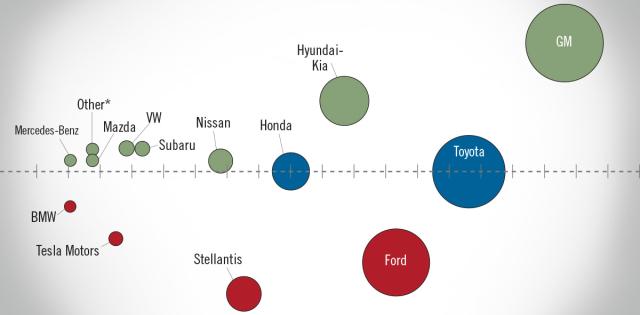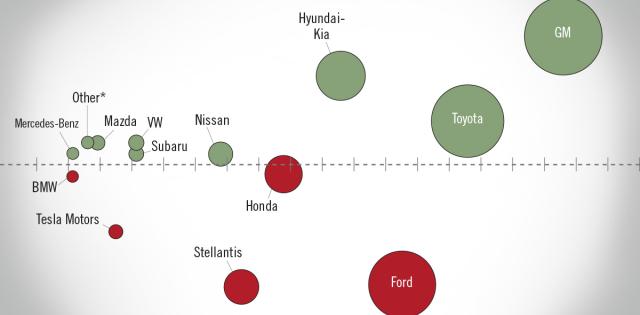The article below is sourced from Reuters Wire Service. The views and opinions expressed in this story are those of the Reuters Wire Service and do not necessarily reflect the official policy or position of NADA.
General Motors reported second-quarter profit and revenue on Tuesday that beat Wall Street's expectations, and raised its annual profit forecast for a second time this year, buoyed by strong pricing and demand for gas-powered trucks.
The company's shares lost 6.4% on the day, however.
The selloff could be related to a number of factors, analysts said, including a shift in the company's Cruise self-driving vehicle strategy, its continued losses in China and a broader concern that the auto industry will become less disciplined on inventory levels and buyer incentives.
"We believe this is just a knee-jerk reaction and the GM quarter was a robust one which should drive the stock higher over the coming weeks and months," said Dan Ives, analyst at Wedbush Securities.
The Michigan automaker is leaning heavily on its gasoline-engine offerings to fuel its profits through a slower-than-anticipated transition to electric vehicles.
GM executives say the company has laid the foundation necessary to meet ambitious ramp-up targets on EVs.
"We're encouraged by the early results we're seeing in EVs now that we can build at scale," CFO Paul Jacobson said in a call with reporters.
A report from the Federal Reserve last week showed motor-vehicle production surged to a four-year high in June.
GM increased its adjusted pre-tax profit projection for the year to $13 billion to $15 billion, from its previous range of $12.5 billion to $14.5 billion.
The company reported adjusted earnings per share of $3.06 that beat Wall Street's average estimate of $2.75, according to LSEG data. The carmaker reported $48 billion in revenue for the three-month period, surpassing analysts' consensus of $45.5 billion in the June quarter.
Executives at GM also provided an update on its Cruise self-driving unit, saying it will focus its development efforts on a next-generation Chevrolet Bolt rather than its planned futuristic Origin vehicle that would not have a steering wheel or other human controls.
GM's stock has outperformed its rivals and the S&P 500 in 2024. The company's share price has increased 38% this year as of Monday, while cross-town rival Ford Motor has notched an 18% increase, and Jeep-maker Stellantis lost 11%.
EV INVESTMENTS AND RETREAT
GM received another cash boost from the U.S. government this summer to support its EV ambitions, although it has walked back many of its targets during the last year.
The Biden administration said this month that it would award GM $500 million to convert one of its Michigan gas-engine vehicle-assembly plants to produce EVs.
GM last week declined to reiterate a target of achieving 1 million units of EV production capacity in North America by the end of 2025. The carmaker also recently lowered its projected EV output for the year, now projecting the higher end of its 2024 production to be 250,000 units, down from a prior forecast of 300,000 units.
CEO Mary Barra told investors that GM would delay the opening of its Orion Assembly EV truck plant by six months, until mid-2026.
Still, GM executives said the company is scaling up production of the Chevrolet Equinox EV and plans to launch several new battery-powered models over the coming months.
"GM seems to be showing that even at lower production they'll be able to rationally roll out EVs and not overspend on that," said Tim Piechowski, portfolio manager with ACR Alpine Capital Research in St. Louis, which owns GM shares.
GM reported a 14% increase in net income over the year-ago period to $2.9 billion.
Although the Detroit automaker has kept its sights set on transitioning its lineup to EVs, Barra has said it plans to introduce plug-in hybrids in 2027. Ford is currently benefiting from significant increases in hybrid sales.
Ford is set to release its second-quarter results Wednesday.
The outcome of the U.S. presidential election in November will also likely affect GM's plans for battery-powered vehicles. Former President Donald Trump has criticized President Joe Biden's approach on EVs, which have included significant government subsidies.
GM is also facing increasing investor scrutiny on its operations in China, which in the past decade have shifted from being a profit engine to a drain on the company's finances.
The company recorded a $104-million quarterly loss in China, a disappointment after executives said they expected to be profitable in the region for the second quarter.
"It's a difficult market right now. And frankly, it's unsustainable, because the amount of companies losing money there cannot continue indefinitely," Barra said.
Jacobson said GM would work with its joint-venture partner in China to restructure its business and plans to cut spending there.
"It's clear that the steps that we have taken, while significant, have not been enough," Jacobson said.
Last month, a leading automotive analyst called on the Detroit Three to withdraw from China to save cash to spend on costly EV production.
For more stories like this, bookmark www.NADAheadlines.org as a favorite in the browser of your choice and subscribe to our newsletter here:











